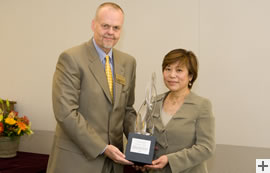Annual award recognizes the fearless spirit of an entrepreneur
April 21, 2009
|
Mays Business School
Entrepreneur Dr. Nancy Chang says she never considered failure to be a possibility when she leveraged all she had to launch her own pharmaceutical company, Tanox, Inc., in 1986. Though it wasn’t until 2003 that the drug she set out to produce was approved by the FDA and a few years later before it found commercial success, Chang says she was never afraid of failure during the long wait.

Dr. Nancy Chang accepts the 2009 Conn Family Entrepreneurial Leadership Award from CNVE Executive Director Richard Lester.
“Entrepreneurs are people that can tolerate vagueness in life. We can’t see things in the future that clear, but we feel comfortable with that…we are unafraid, fearless. We have an idea and we go for it,” said Chang, describing her journey from medical student to the leader of a successful business.
Chang is currently the president of Apex Enterprise, Inc. and managing director of OrbiMed Advisors LLC (Asia). She was recently recognized by the Center for New Ventures and Entrepreneurship (CNVE) at Texas A&M University’s Mays Business School with the Conn Family Entrepreneurial Leadership Award. Given in honor of C.W. and Dorothy Conn of Conn’s Appliances, this annual award is presented to a successful business leader that exemplifies entrepreneurial vision as well as managerial insight and business acumen. Past recipients have included L. Lowry Mays of Clear Channel Communications, Pizza Hut co-founder Frank L. Carney, Administaff co-founder Paul J. Sarvadi, and Jason’s Deli founder Joe Tortorice.
The goal of this award is to bring successful entrepreneurs into the classroom to interact with and inspire current students, says CNVE Executive Director Richard Lester. In keeping with that goal, Chang spoke to several student groups while on campus accepting her award. She motivated her audiences with her personal success story, which started in 1973 when she emigrated to the U.S. from Taiwan. Though she didn’t speak English and came from a culture that didn’t encourage women in the sciences, Chang went on to earn her PhD in biological chemistry from Harvard Medical School.
“I think America is such a wonderful country,” said Chang, who credits the opportunities in this country for much of her success.
Chang has spent the past 26 years working in the biotechnology field in a number of capacities, from educator (she taught at Baylor College of Medicine), to researcher, to leader in several biotech companies. In the 20 years that she owned and operated Tanox, Chang led the company to exponential growth as she addressed the unmet medical needs she saw in the areas of asthma, allergy, inflammation, and diseases affecting the human immune system.
For Chang, the pursuit for a drug that combats allergic diseases was never about getting rich. She knew from personal experience that there was a need for these kinds of medications, as the drug she developed would serve her own immediate family. When Tanox introduced Xolair, it was the first product available for treating those with allergy-related asthma.

Chang shared her personal success story with several student groups during her visit.
The product was a hit, and Tanox sold to Genentech, Inc. in August 2007 for nearly $1 billion.
When Chang sold the company, she planned to retire from the corporate world, but instead was approached by OrbiMed, whom she had worked with previously. Impressed by her business skills and knowledge of Eastern markets, OrbiMed asked Chang to head up the new branch of their business in Asia—an offer that for Chang was too good to refuse. Chang commented that Asian markets are becoming increasingly important in the pharmaceutical industry, as the cost of developing drugs in the U.S. is extremely high—on average, a single drug takes 20 years and $1.5 billion to bring to market. Finding a sustainable business model that includes outsourcing some elements of production to Asia is a must, she says.
Chang has received numerous academic, national, and international awards for her contributions to the biopharmaceutical industry, including Houston Entrepreneur of the Year. In 2001, she was inducted into the Texas Science Hall of Fame. In May of this year, she will be honored with the Houston Technology Center’s Lifetime Achievement Award in Life Sciences. She is active on the boards of a number of organizations, such as the Federal Reserve Bank in Houston and Charles River Laboratories.
Chang shared that currently OrbiMed is working with a company that is developing a drug to treat neuroblastoma, an aggressive cancer that affects children. It’s projects like this that keep her in the business. She is determined to improve the lives of patients, one great drug at a time, she says. “My passion is really about the product.”


